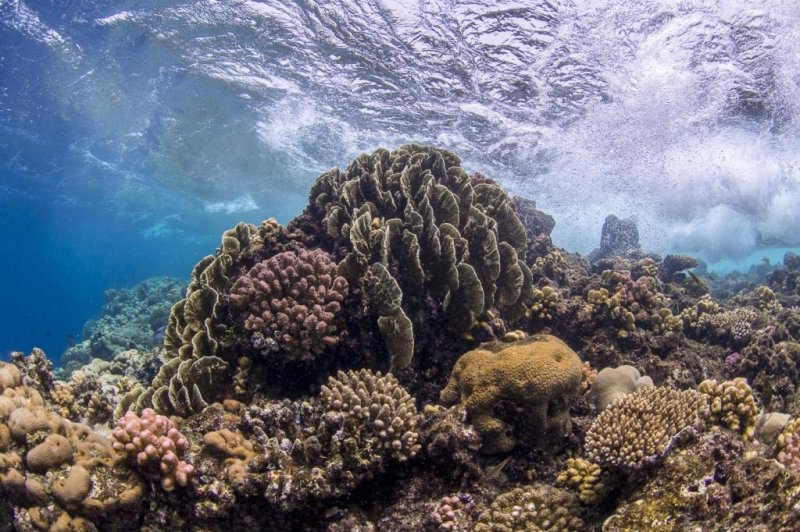Researchers are searching for ways to protect coral from the stresses of global warming. Their DNA and the DNA of their microbial inhabitants could offer clues. Photo by Anna Roik
Sept. 24 (UPI) -- New DNA analysis has offered fresh insights into the ways corals partner with algae and bacteria.
"Symbiotic relationships are incredibly important for thriving corals," Steven Robbins, a researcher at the University of Queensland, said in a news release. "The mostly striking example of this is coral bleaching, where corals expel their algal symbiotic partners at higher-than-normal water temperatures."
The algae that partner with coral are dinoflagellates, a group of phytoplankton. The algae get shelter from coral, while the coral usurp some of the energy algae harvests from sunlight via photosynthesis. The coral use some of that energy to synthesize calcium carbonate to build out the skeleton architecture that forms coral reefs.
If this symbiosis breaks down for long enough, coral die.
"It's possible that equally important interactions are happening between corals and their bacteria and single-cell microorganisms, archaea, but we just don't know," Robbins said. "To properly manage our reefs, we need to understand how these relationships work, and genomics is one of our best tools."
For the new study, published this week in the journal Nature Microbiology, scientists collected samples of the coral Porites lutea from a reef off the coast of Australia. In the lab, researchers sequenced and separated out the DNA of the coral and its microscopic partners.
"Once we've sequenced the genomes, we used computer algorithms to look at the entire library of genes that each organism has to work with," Robbins said. "This allows us to answer questions like, 'What nutrients does the coral need, but not make itself?'"
The initial genomic analysis of the algae and bacteria inside coral suggests microbial partners help supply coral with fixed carbon, B vitamins and amino acids. Scientists also identified microbe genes capable of producing ammonia, urea, nitrate, dimethylsulfoniopropionate and taurine transformation, all of which may be important for nutrient acquisition and retention.
The research is only in its infancy, however, and researchers expect their work to inspire insights into coral health the way genomics has precipitated advances in human medicine over the last 20 years.
"For the first time, we now have the genomes of a large number of the microbes that make up this coral, which is incredibly important for their survival," said David Bourne, an associate professor at James Cook University and the Australian Institute of Marine Science. "It's truly ground-breaking -- this is the blueprint for coral and their symbiotic communities."
Researchers hope that followup studies will reveal new strategies for enhancing the resiliency of coral threatened by climate change. Previous studies have shown some corals can pass along communities of microbes to their offspring that help protect the young coral from the stresses of marine heatwaves.















